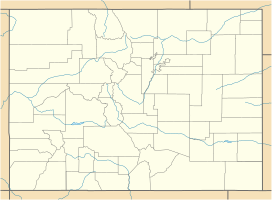The Grand Valley[1] is an extended populated valley, approximately 30 miles (48 km) long and 5 miles (8.0 km) wide, located along the Colorado River in Mesa County (and slightly into Garfield County) in western Colorado and Grand County in eastern Utah in the Western United States. The valley contains the city of Grand Junction, as well as other smaller communities such as Fruita and Palisade. The valley is a major fruit-growing region that contains many orchards and vineyards, and is home to one of two designated American Viticultural Areas in Colorado: the Grand Valley AVA. It takes its name from the "Grand River",[2] the historical name of the Colorado River from its confluence with the Gunnison River that was used by locals in the late 19th and early 20th century. The valley is the most densely populated area on the Colorado Western Slope, with Grand Junction serving as an unofficial capital of the region, as a counterpoint to Denver on the eastern slope of the Rocky Mountains in the Colorado Front Range. Interstate 70 and U.S. Highway 6 run through the valley from west-to-east. The Grand Valley is part of the larger Colorado Plateau desert lands.
| Grand Valley | |
|---|---|
 A portion of the Grand Valley at dusk, November 2013 | |
| Geography | |
| Country | United States |
| States | |
| County | |
| Coordinates | 39°11′N 108°43′W / 39.183°N 108.717°W |
Description
editGrand Valley begins where the Colorado River widens at the mouth of De Beque Canyon to the east of Palisade, then follows a wide arc bending to the west. The Colorado receives the Gunnison River, one of its major tributaries, just south of Grand Junction near the midpoint of the valley. The valley is surrounded by large plateau formations, including the Book Cliffs along the north side, the Grand Mesa along the southeast side, and the Uncompahgre Plateau to the southwest. Colorado National Monument sits on a ridge on the southwest side of the valley west of Grand Junction. Much of the surrounding table land areas rimming the valley are public lands controlled by the Bureau of Land Management.
History
editThe name "Grand Valley" has been associated with the area since the mid-nineteenth century. The present Colorado River above Grand Junction was known as the Grand River as early as 1842. The city of Grand Junction was so named because of its position at the junction of the Gunnison and Grand Rivers. The Green and Grand Rivers united in eastern Utah to become the Colorado River. The Grand River was renamed Colorado River by act of the Colorado State Legislature, approved March 24, 1921, and made official July 25, 1921 in House Joint Resolution 460 of the 66th Congress.[3] In addition to Grand Junction, the name "Grand" still remains in the Grand Valley between Palisade and Mack; in Grand Mesa, which stands more than a mile above the Grand and Gunnison Valleys and in Grand County, Colorado.[4]
The valley was an area historically occupied by the Ute people (Parianuche band). Settlers began to arrive in the 1880s, farming the valley for a variety of grains and fruits. In the 1890s, it was discovered that sugar beets were found to have a high sugar content and they became a major crop along with other fruits, grains and vegetables. Also in 1890, State Governor George A. Crawford planted a 60 acres (24 ha) wine vineyard in the Grand Valley. By 1900, there were over 1,000 farms in the Grand Valley growing wine grapes and local sales tax records showed that 1,744 gallons of wine were sold that year.[5] At the turn of the 20th century, evaporation techniques allowed fruit-growers to ship their products more efficiently to distant markets, yielding an expansion of fruit growing in the valley.In 1918, the Government Highline Canal was completed to provide water to cultivate 50,000 acres (20.0 km²) in the valley. The project included a roller dam in De Beque Canyon, the largest of three such dams of this type in the nation.[6]
See also
editReferences
edit- ^ "Grand Valley". Geographic Names Information System. United States Geological Survey, United States Department of the Interior.
- ^ Dawson, John Frank. Place names in Colorado: why 700 communities were so named, 150 of Spanish or Indian origin. Denver: The J. Frank Dawson Publishing Co. p. 25. Archived from the original on 2024-09-12. Retrieved 2016-06-27.
- ^ Renaming the Grand River, Colo (Hearing Before the Committee on Interstate and Foreign Commerce of the House of Representatives, Sixty Sixth Congress, Third Session, on H.J. RES 460). 1921. p. 19. Archived (PDF) from the original on 2021-08-05. Retrieved 2022-04-21.
- ^ "The Grand Valley Viticultural Area (89F197P)" (27 CFR Part 9 [T.D. ATF-317; RE: Notice No. 714] Final rule). Federal Register. Alcohol, Tobacco, Firearms, and Explosives Bureau, Treasury Department. 1991-11-25. pp. 59213–59217. Archived (PDF) from the original on 2021-06-19. Retrieved 2022-04-21. This article incorporates text from this source, which is in the public domain.
- ^ Havlen, Naomi (2005-09-20). "Colorado's wine industry green and growing". The Aspen Times. Swift Communications, Inc. Archived from the original on 2020-10-22. Retrieved 2022-04-21.
- ^ "Grand Junction, Colorado History in Pictures". Archived from the original on 2005-04-09.
External links
editMedia related to Grand Valley (Colorado-Utah) at Wikimedia Commons

